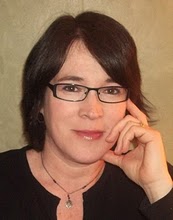
Last Friday we chatted with Canadian author Sara Davison, whose novel, The Watcher, released in March 2011. [You can read part one of the interview here.]
Janet: Welcome back, Sara. You’ve persevered a long time on the road to publication. What hope can you share with those of us still slogging?
Sara: It is a difficult journey, and a tough business that is only getting tougher as a result of uncertain economic times and on-going developments in technology. When this book was rejected yet again a year and a half ago I launched a blog called Choose to Press On, emphasizing the fact that if you believe in your story, and believe that God gave you this gift and this calling (and you really, really have to believe that or I would strongly recommend looking into other career options) then you have to just keep going and not give up. The stories are given for a purpose, and that purpose will be fulfilled in God’s time and in his way, not ours. In the meantime, keep working on your craft, honing it to continually become a better and stronger writer. To get published now, work can’t just be good, it has to be excellent which, as writers working for the glory of God, should be our objective anyway. After that, we have to leave the results up to God.
Janet: Sound advice. Thank you. Are you working on a sequel?
Sara: Good question Janet. And the answer is maybe. When the book was UnBroken, I had a sequel written. Now that it has all been changed I’m not sure if the sequel still works or is needed. However, people have been asking about one, so I am taking a hard look at the other book to see if it can be rewritten to follow The Watcher or not. I will have to keep you posted on that. I do have another suspense novel written, The Child-Snatchers, which was short-listed in the Word Alive contest, so I am currently looking into publishing options for that one as well, but that one is the first in a completely different series.
Janet: Is there a particular song or Scripture verse that’s made a big difference for you?
Sara: The song “Praise You in the Storm” by Casting Crowns has had a big impact on me. The first time I heard it, a girl from our church was singing it at the funeral for her twenty-year old brother who had died suddenly in a car crash. Praising God is always powerful, but I was overwhelmed by how powerful it was that someone could be in the midst of devastation and heartbreak, and still praise God. I often thought of this song, and of the moment I first heard it, when I was writing about how Kathryn dealt with what happened to her in The Watcher. 
Janet: I think the choice to praise God in the hard times and in the pain is very powerful. And it’s something we all need to do at times. Next question: Are you a writer who likes to immerse herself in details of the setting while incubating the story idea?
Sara: Actually, that depends on what I am writing. The Child-Snatchers is set in a diner in Toronto, so I have spent a lot of time in diners in my town, trying to capture the feel, sounds, smells etc. Other than my husband questioning why I am suddenly spending so much more money on coffee and breakfast, I love being surrounded by everything my characters see and experience in the book. In The Watcher, the setting doesn’t play as big a role as the actions and interactions of the characters, so I did not end up spending extra time on a ranch, or travelling out to British Columbia. I do immerse myself in the dialogue, internal and verbal, of the characters whenever I write, however. I don’t tell this to many people, but I do act out a lot of the scenes, holding up both (or more) ends of the conversation and really putting myself into the action so that I can feel and think everything the character would be feeling and thinking. Like most writers, I find my characters become very real to me. In fact, I realize they are becoming too real to me when my poor husband says something to me and I find myself thinking “Nick would never say that to Kathryn!” That’s when I have to stop and remind myself that Nick is a fictional character and it’s not really a fair comparison.
Janet: What do your family think of your writing?
Sara: Well, other than moments like that, they are unbelievably supportive. It’s not an easy thing to live with a writer, and to go through all the emotional ups and downs that come with that calling. It would be extremely difficult to pursue that vocation if your spouse and children (and, in my case, grandmother, parents, sisters, brothers-in-law, nieces, nephew, aunts, uncles, cousins etc.) didn’t support you and encourage you daily not to give up. My husband Michael is my biggest encourager, and tells everyone about the novel, whether they want to hear about it or not J. My kids think it’s pretty cool that I’ve written a book, and they seem to be impressed. My older two anyway. My youngest son, who is seven, recently said to me, “I’m glad you stay home with us and don’t work. Well, except for writing books, but that’s easy!” They make me laugh, anyway, and that goes a long way toward keeping me sane and keeping me going.
Janet: Writers are told to read widely and voraciously. I think that’s one of the perks of the deal. What are you reading these days?
Sara: At the moment I am reading The Story of Edgar Sawtelle for a book club I attend and it is a beautifully written book. I am also reading One Thousand Gifts by Ann Voskamp, another beautiful, poetic book that is teaching me to live with a perpetual attitude of gratitude, and an awareness of the grace of God in the ordinary and everyday things of life. I also recently read In the Company of Others by Jan Karon, as enjoyable as the rest of the series, and Rescued by Donna Dawson is next on my list. I try to read a variety of books and authors, and to expand my horizons beyond what is familiar and, sometimes, even comfortable, in a desperate attempt to learn how great writers tell a story that has a powerful effect on their readers.
Janet: What do you like to do to get away from it all?
Sara: Is that an option? It’s pretty tricky for me to get away from it all these days, as I have three kids and have moved away from my family and don’t know very many people in town yet. Mostly I escape up to my room with a book, and I walk every morning with a friend down to the lake or on one of the many trails around here. Now that my kids are a little older, my husband and I do actually get out for a meal or a movie once in a while, and an hour or two of uninterrupted conversation is pretty much as close to a getaway as we’re taking these days.
Janet: Uninterrupted adult conversation is nothing to sneeze at! What’s the most surprising/fun/zany/scary thing you’ve ever done?
Sara: Wow, after contemplating this question for quite a while, I have come to the conclusion that I mustn’t be a very surprising/fun/zany/scary kind of a person, as nothing significant immediately came to mind. I’m not a huge risk-taker by nature, so this whole journey of putting myself and my work out there has been an on-going process of pushing myself further and further out of my comfort zone, which is always a good thing. Flying is I guess the scariest thing I have done, mostly because I have encountered pretty much everything that can go wrong with a flight short of crashing – being lost in fog, landing in tornadoes and the plane almost tipping over, having the plane searched for a bomb after someone checked in and didn’t get on a flight loaded with Hell’s Angels. I will still do it when necessary, but it does require a leap of faith and trust every time. Oh, and one of the most fun things that ever happened to me was bumping into Donny Osmond – literally – on a sidewalk in Toronto one day when he was there performing in Joseph.
Janet: Sounds like plenty of things that could work into future novels! Sara, thanks so much for taking time to let us get to know you a bit. May the LORD continue to bless you and make you a blessing to others—in every area of your life.
===
Sara Davison blogs at Choose to Press On, and you can also find her on Facebook and on the Great Canadian Authors site. Visit her website, saradavison.org, for information on her current projects, an excerpt from and discussion questions for The Watcher, interviews, reviews and more.
Like this:
Like Loading...






